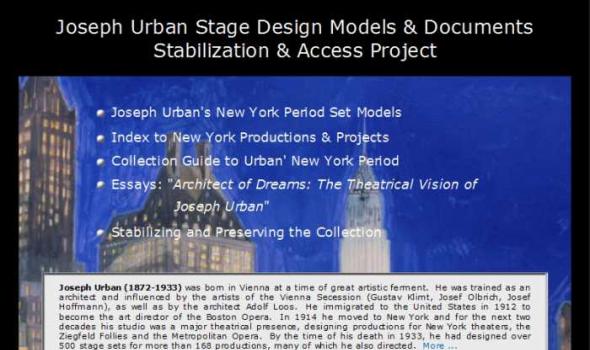Category: Image, Columbia University, New York
Results
APIS is a collections-based repository hosting information about and images of papyrological materials (e.g. papyri, ostraca, wood tablets, etc) located in collections around the world. It contains physical descriptions and bibliographic information about the papyri and other written materials, as well as digital images and English translations of many of these texts. When possible, links are also provided to the original language texts (e.g. through the Duke Data Bank of Documentary Papyri). The user can move back and forth among text, translation, bibliography, description, and image.
About About the Lehman Special Correspondence Files The Columbia University Libraries has scanned and made available here electronically the Special Correspondence Files of Herbert Lehman. More than 37,000 documents are included. Typed documents have also been OCRed, permitting full-text searching. The Special Correspondence Files of the Herbert Lehman Papers contain correspondence with nearly 1,000 individuals from 1895 through 1963. Beginning with letters from Lehman's family in the late nineteenth century, the series documents the range and scope of Lehman's long career in public service. Lehman started the series in an attempt to isolate materials he wanted for his own personal use.
Yul phyogs so soʾi gsar ʾgyur me loṅ The Tibet Mirror (Tib. Yul phyogs so so'i gsar 'gyur me long) was published from 1925 to 1963 in Kalimpong, and chronicles the most dramatic social and political transformation in Tibet during a time when vernacular writing was relatively scarce and a Tibetan media practically non-existent. The paper also relayed information about World War II, the independence of India, and other global news to Tibetan readers in Lhasa, Gyantse, Kham, etc., and to traders and aristocrats who frequently traveled from Lhasa via the Chumbi Valley to Kalimpong, Darjeeling and Calcutta.
The NEH-funded Joseph Urban Stage Designs Stabilization and Access Project of 2002-2004 focused on materials relating to Urban's New York theater career from 1914-1933, specifically the documentation of his productions for the Ziegfeld Follies and other theater producers, and his productions for the Metropolitan Opera. The archives of these productions contained many thousands of documents, photographs, sketches, technical drawings, and watercolors, as well as the actual stage models. Some 61 of the models remained fully assembled when acquired by Columbia, while 281 models had been collapsed by the Urban studio into one or more flattened bundles each. Press Release, 5/10/02 Selection for Digitization.
The Notable New Yorkers Web site offers audio recordings and transcripts of interviews with ten influential New Yorkers, drawn from the collections of the Oral History Research Office of the Columbia University Libraries . These interviews, conducted by the Office between 1955 and 2001, open an imaginative portal into twentieth-century New York City and the ways in which it has deeply affected the culture and history of the United States and the world beyond.
The New York Real Estate Brochure Collection, housed in Avery Architectural & Fine Arts Library's Classics Department , consists of over 9,200 advertising brochures, floor plans, price lists, and related materials that document residential and commercial real estate development in the five boroughs of New York and outlying vicinities from the 1920s to the 1970s. The majority of the collection is offerings for apartment and other residential spaces. This collection of ephemeral advertising material constitutes an invaluable resource for researching New York City architecture. The brochures and related materials provide architects' and agents' names, illustrate interior and exterior views of buildings, display typical floor plans, and list prominent features of the buildings.
About the Collection The C. V. Starr East Asian Library's run of Ling long women's magazine is one of the most complete outside China, acquired, we believe, in the late 1930s or early 1940s as part of a concerted effort to enlarge Columbia University's Chinese-language holdings. The collection expanded dramatically in the years between 1938 and 1941 when the holdings more than doubled, thanks to a special grant from the Rockefeller Foundation.
Chinese Paper Gods Collection Essays The images in this collection were assembled by Anne S. Goodrich (1895–2005) in 1931, when as a Christian missionary in Peking she became interested in local folk religious practices. She studied the paper gods in this collection for much of her life. After publishing her research conclusions in 1991, she donated these prints to the C. V. Starr East Asian Library, Columbia University. The images are divided initially by usage: Those which were purchased to be burned immediately and serve as emissaries to heaven; and those which were purchased to be displayed for a year while offering protection to the family in a variety of ways, before being burned. The images are further divided by display locations and by the deities they represent.
The Biggert Collection of Architectural Vignettes on Commercial Stationery Gift of Robert Biggert in Honor of Lisa Ann Riveaux The Robert Biggert Collection of Architectural Vignettes on Commercial Stationery was donated to the Avery Architectural and Fine Arts Library by Robert Biggert in honor of Lisa Ann Riveaux. This unique collection of printed ephemera contains over 1,300 items with architectural imagery spanning the dates 1850 to 1920, in more than 350 cities and towns in forty-five states, as well as the District of Columbia and U.S. possessions. New York City is particularly well-represented with over 100 items portraying structures below Houston Street alone.
Bunraku, Japanese puppet theater, is an unusually complex dramatic form, a collaborative effort among puppeteers, narrators, and musicians. Columbia University Libraries' Bunraku collection is one the most extensive in the world, documenting its rich performance tradition, which has been recognized by UNESCO as a "masterpiece" of humanity.
The Bunraku gallery is divided into plays, productions, authors, backstage subjects, kashira, and characters. It documents the form's revival in the second half of the 20th century, through more than 12,500 slides and nearly 7,000 black-and-white photographs of rehearsals and performances.
























